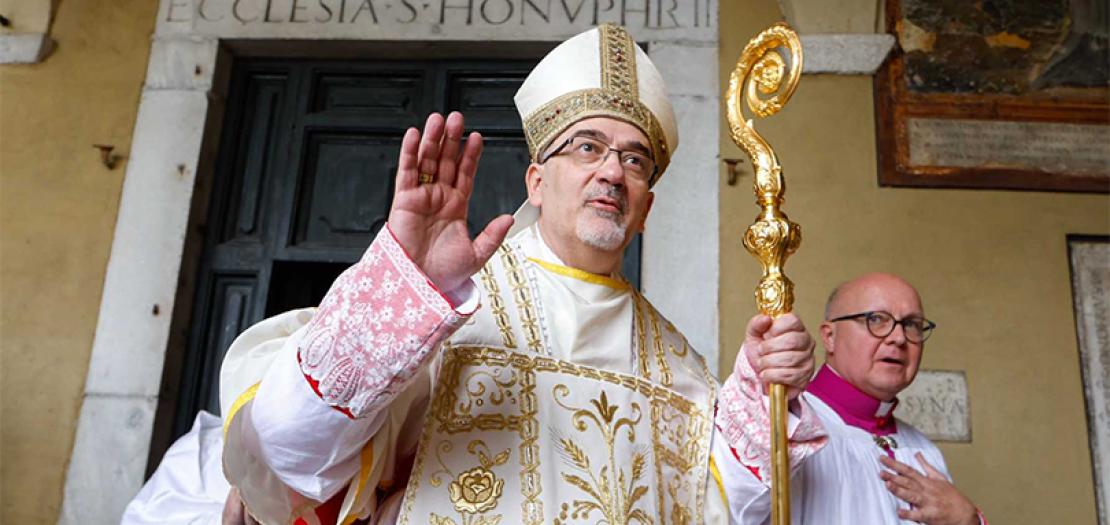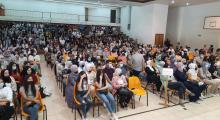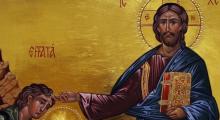Issued by the Catholic Center for Studies and Media - Jordan. Editor-in-chief Fr. Rif'at Bader - موقع أبونا abouna.org

With the current Gaza war nearing its one-year mark, and with few credible prospects for peace in the short-term, Cardinal Pierbattista Pizzaballa, Latin Patriarch of Jerusalem, has urged Christians to stay, and has asked for prayers amid what he has called an “objectively intolerable” situation.
Speaking in a video message to Catholic parishes in the Holy Land published July 22, Cardinal Pierbattista Pizzaballa acknowledged that “life here is very difficult” and that “the Holy Land is not always an easy place to live.”
“Especially in this period of war, the situation became more dramatic, more difficult for all, and (there are) a lot of challenges,” he said, noting that the situation is especially trying for families, those with children and those who want to grow their families.
In the current situation, a common temptation is to leave and make a better life elsewhere, Pizzaballa said, saying, “yes, maybe (it would) be less complicated to leave, to spend our life somewhere else, but we receive a call as Christians to live in this land, to make our contribution, to build our future here in this land.”
“We cannot give up, there is always hope, and hope is not coming from outside,” he said, saying hope is something that comes “from our heart, and I’m sure that if we’re united together, then we can still give to our children a reason to hope for the future.”
The Gaza war ignited nearly a year ago, when Israeli forces retaliated for an October 7 surprise attack by Hamas that left some 1,200 people, mostly civilians, dead, and around 250 others taken as hostages.
Gaza’s Holy Family Catholic parish and school have become a home to close to 600 people who have been sheltering there for months, as bombs have destroyed surrounding housing and infrastructure.
Cardinal Pizzaballa recently concluded a July 18-21 visit to Ireland, where he was interviewed by Father Bill Kemmy on behalf of the Irish Catholic Bishops’ Conference of Ireland about the current status of Gaza and its Catholic parish, his visit to Gaza in May, and the importance of maintaining hope.
In the interview, broadcast July 21, Pizzaballa was asked about a recent description of the situation in Gaza as “objectively intolerable.”
“The facts are very clear about what is going on,” he said, saying what happened to Israel last October “is also objectively intolerable, but also what is going on in Gaza.”
According to Pizzaballa, in addition to the roughly 40,000 casualties, around 80 percent of the houses in Gaza gave been destroyed and many are on the brink of starvation.
“It’s not the first time we have had a war, but we never saw people starving, as we are seeing (now). The proportion of the violence we are witnessing is something that goes beyond any understanding,” he said.
Recalling his visit to Gaza in May, Pizzaballa said he had seen pictures prior to going, “but when you enter inside the impression is totally different, because the landscape is totally different.”
“There are no roads, we have to go through the mountains of garbage or rubble, and you see the population living in these ruins,” he said, saying the sight of children living in these conditions has “a very strong impact on you.”
In terms of basic necessities, Pizzaballa said “nothing is working,” and that there is no electricity, gas, water, sewage or methods of communication, “so you live in very, very poor conditions.”
Christians who live on the church compound, he said, “lost everything,” and are sleeping in the school classrooms with blankets separating one family from another. They cook just once or twice a week, with the provisions needing to last for the entire week.
It has also been months since people have eaten fresh fruit or vegetables, he said, “so we have a very evident lack of vitamins” that is evident in peoples’ faces.
He also lamented the lack of medicines to treat basic illnesses such as diabetes, and a widespread lack of hygiene that he said is having a particularly hard impact on children and the elderly, and “There is no way to support, to help them.”
With around 600,000 people in north Gaza City and no functioning hospitals in the area, the situation, Pizzaballa said, is dire.
Pizzaballa also spoke of the state of the Gaza parish and the presence of Christians in the city, noting that there were around 1,000 Christians, Catholic and Orthodox, living in Gaza prior to the war, but now that number has dwindled to just 621 Christians.
“Some of them have been killed by the bombs at the beginning of the war in October, others died, killed in December by some snipers, others died because of a lack of medical assistance, and others managed, when it was possible, to immigrate, they got a foreign visa so they could leave this terrible situation,” he said.
For those who have stayed, they are living on church grounds “in very poor conditions,” using wood from furniture pulled from the rubble of nearby houses for heat and for cooking.
The Missionary of Charity sisters who live in the convent adjoined to the church also assist 60 severely disable children, Pizzaballa said, noting that part of the convent has been destroyed by tanks, so a portion of the parish has been cordoned off as a shelter for the children.
“We have tried to do what is possible to help and support them,” Pizzaballa said.
Asked if and how the people are able to maintain hope amid such dire circumstances, he cautioned against confusing hope with optimism, saying, “I’m not very optimistic about the future, but hope is a way of being in life, where you keep the faith.”
“If you have faith, strong faith in God, or faith in something else if you are not a believer, this also gives you an instrument to live the present situation in a different way, with purpose,” he said.
Faith, Pizzaballa said, can also give believers the strength to do everything in their power to change what they can in life.
“We cannot change the macro-political level and so on, but at least in our communities, in our relations with the people we meet, to have a different attitude where you consider other human beings, not to dehumanize the other,” he said.
He stressed the importance of being attentive to the way in which one speaks to and about others, and the attitude they have toward others, saying this is key to fostering good relationships and in being able to do something constructive for change.
Pizzaballa asked Catholics to continue praying for Christians in the Holy Land, and to organize meetings and conferences to discuss the situation and to inform people about what is happening “in a balanced way.”
“The truth is very important to say… but also without becoming part of the confrontation. We always have to be a constructive presence and to show, as much as you can, empathy. You cannot change the situation, but you can say a word of empathy and closeness to all of us,” he said.







